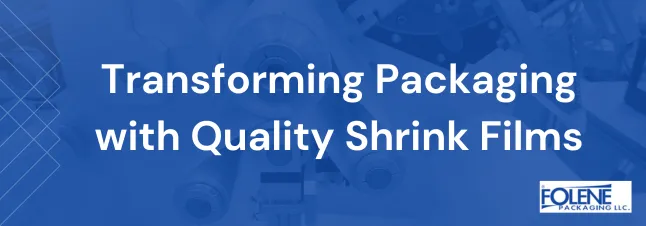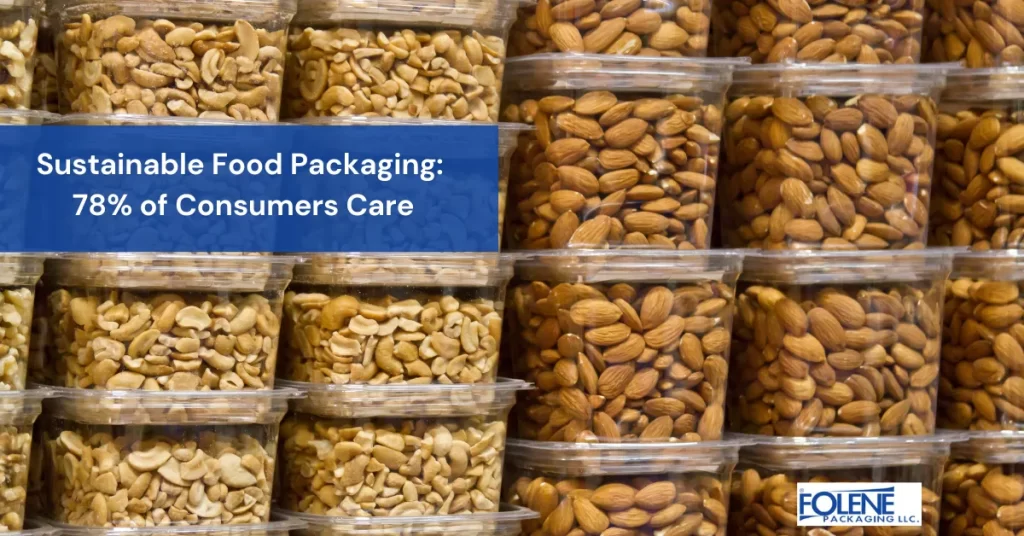
Sustainable Food Packaging: 78% of Consumers Care
Consumers are more aware than ever before of the importance of sustainable food packaging. Manufacturers in the food packaging industry are becoming more environmentally conscious, but consumers often push for that improvement. A survey in The Economist revealed that consumers believe brands have the same level of responsibility to create positive environmental change as governments.
Consumers are indicating how important sustainable goods are to them: Since 2016, searches for sustainable products have increased by 71%. Also, a survey by McKinsey & Co. found that 72% of respondents were “actively buying more environmentally friendly products than 5 years ago,” and 81% were committed to increasing such purchases over the next 5 years. Sustainability in food packaging, from plastic bottles to shrink materials, has become a focal point of the greater issue that is global sustainability.
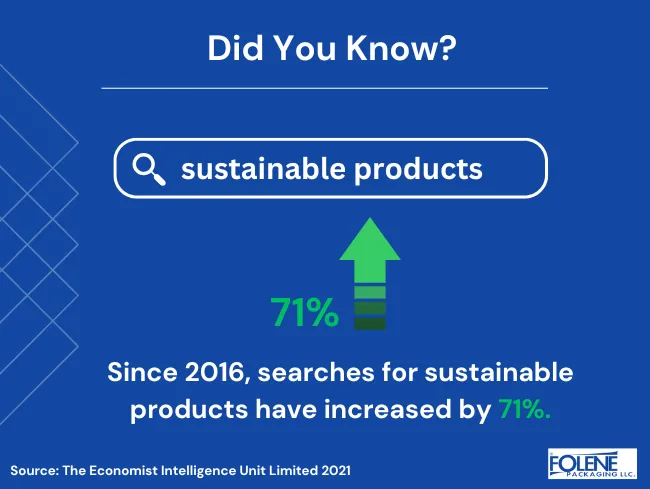
What is Sustainable Food Packaging?
Sustainable food packaging means top-quality, clean packaging for foodstuffs that is produced from non-toxic materials that protect human health and the environment. Sustainable food packaging solutions use renewable resources, including bioplastics, plant-based materials, and compostable or biodegradable alternatives. Other terms for sustainability in packaging include green packaging, ecological or eco-friendly packaging, conservationist packaging, and environment-friendly packaging.
At the core of sustainable solutions in packaging are the goals:
Reduce waste by ensuring packaging that is recyclable, compostable, or biodegradable
Avoid the use of finite resources
Minimize environmental impact
Why Do We Need Sustainable Food Packaging Alternatives?
Packaging distributors need to offer customers sustainable food packaging alternatives as a way to protect the world. Sustainable food packaging enables distributors and end-users to:
Minimize material waste
Save resources
Diminish environmental impact
Reduce carbon emissions from production and transportation
Increase awareness of responsibility
Adopt ethical branding
Reach a lower carbon footprint
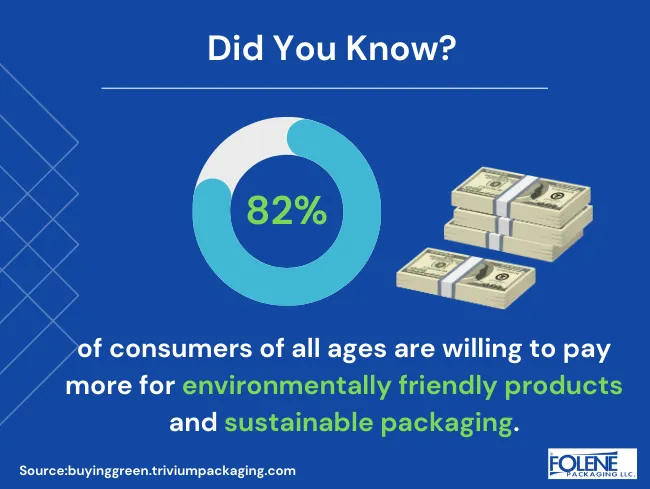
Modern sustainable packaging options allow producers to care for the environment and sustainability while preserving total functionality and maintaining aesthetically pleasing packaging by using materials that are widely recyclable.
What is Sustainable Consumption and Production?
Sustainable consumption and production (SCP) means using products in the best way to minimize the detrimental impact on the environment. It means responding to today’s needs with concern for the needs of future generations by using renewable sources of raw materials and energy. The characteristics of sustainable food packages fit snugly into SCP and support sustainable practices in the food industry. This allows conscious end-users to enjoy products while minimizing damage to the environment. Packaging applications include innovations in increasingly recyclable plastic, reusable bags and containers, plastic-free plastic cutlery, and film-wrapped fresh produce.
Sustainable Food Packaging Matters to Consumers: 4 Statistics
Although quality and price top the list, sustainability-based packaging has become very important to consumers, as these powerful facts and figures show.
Research by NielsenIQ shows that 78% of U.S. consumers are concerned about global sustainability and living a sustainable lifestyle.
Customer analysis shows that sustainable food packaging matters so much that 82% of people don’t mind paying more for environmentally friendly products and sustainable packaging.
Consumers align themselves with brands that show environmental responsibility. 75% of surveyed millennials said that environmental sustainability was an important factor when choosing what to buy.
A 2020 Boston Consulting Group study discovered that 59% of consumers avoided products with food packaging that was harmful to the environment, and 47% would not purchase food with harmful or toxic packaging.
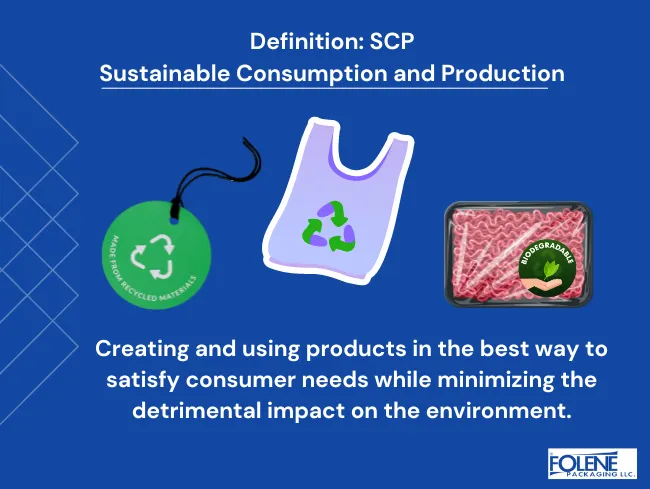
Sustainable Practices for Hygiene and Food Safety
Despite consumer concerns about sustainability and environmental impact, people are still cautious or perhaps extremely concerned about hygiene and food safety, especially in the wake of COVID-19. Eateries are notorious for the amount of packaging waste produced by wrapping individual portions and double-wrapping products to preserve the transportability of food items. The business world must respond to the growth in the use of packaging and containers with innovation, especially with the increase in e-commerce, online orders, and food deliveries. The solution is to find innovative recycling solutions and sustainable food packaging solutions.
Environmentally sustainable food packaging is more attainable nowadays than it was previously. Plant-based packaging and other biodegradable options mean that the consumer can have their (individually portioned, double-wrapped) cake and eat it without fear of food-related contamination or environmental damage.
The Procurement Officer of a manufacturing company establishes the company’s sustainability initiatives and policies when purchasing raw components – and this should reflect consumer preferences as shown above. Companies can then print a sustainability logo on the packaging to draw consumer attention to the sustainably sourced packaging! This can positively affect sales, as 59% of respondants to a 2023 Buying Green survey said that they look for information or symbols denoting recyclable or sustainbale packaging on the products they buy.
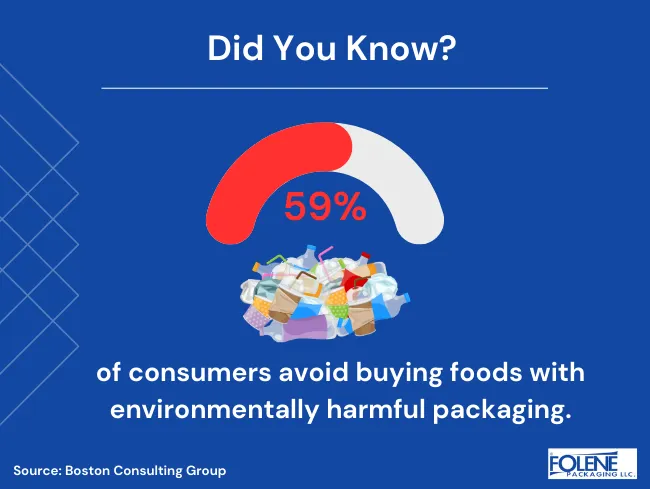
Flxtite® Is the Sustainable Food Packaging Solution
Folene Packaging LLC is THE alternative source for high-quality shrink films. Under the brand name Flxtite®, Folene Packaging offers a full range of shrink film products. Flxtite® is produced in the USA using European-grade raw materials, including biodegradable, compostable Ecolene® film. Our Flxtite® films provide a range of versatile, innovative, and sustainable food packaging options. Flxtite® films can be made to order in various sizes or customized to your end-user’s needs.
Flxtite® is a high-quality packaging option that enables the end-user to package food products safely, healthily, economically, and efficiently – all while maintaining sustainability and being a leader in sustainable food delivery packaging solutions.
